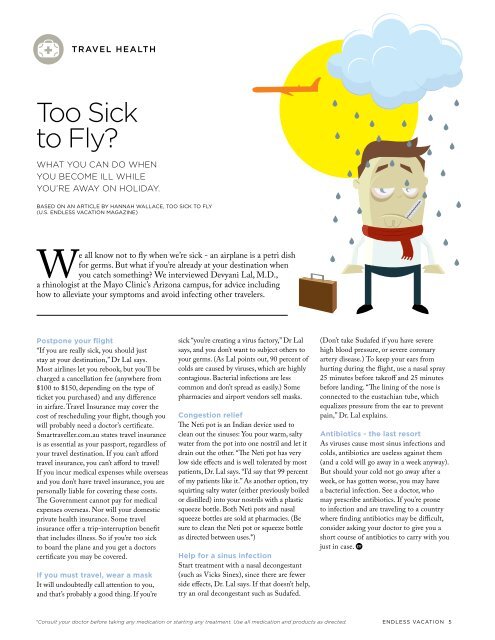RCI EV Issue 8 Spring 2013
Create successful ePaper yourself
Turn your PDF publications into a flip-book with our unique Google optimized e-Paper software.
TRAVEL HEALTH<br />
Too Sick<br />
to Fly?<br />
WHAT YOU CAN DO WHEN<br />
YOU BECOME ILL WHILE<br />
YOU’RE AWAY ON HOLIDAY.<br />
BASED ON AN ARTICLE BY HANNAH WALLACE, TOO SICK TO FLY<br />
(U.S. ENDLESS VACATION MAGAZINE)<br />
We all know not to fly when we’re sick - an airplane is a petri dish<br />
for germs. But what if you’re already at your destination when<br />
you catch something? We interviewed Devyani Lal, M.D.,<br />
a rhinologist at the Mayo Clinic’s Arizona campus, for advice including<br />
how to alleviate your symptoms and avoid infecting other travelers.<br />
Postpone your flight<br />
“If you are really sick, you should just<br />
stay at your destination,” Dr Lal says.<br />
Most airlines let you rebook, but you’ll be<br />
charged a cancellation fee (anywhere from<br />
$100 to $150, depending on the type of<br />
ticket you purchased) and any difference<br />
in airfare. Travel Insurance may cover the<br />
cost of rescheduling your flight, though you<br />
will probably need a doctor’s certificate.<br />
Smartraveller.com.au states travel insurance<br />
is as essential as your passport, regardless of<br />
your travel destination. If you can’t afford<br />
travel insurance, you can’t afford to travel!<br />
If you incur medical expenses while overseas<br />
and you don’t have travel insurance, you are<br />
personally liable for covering these costs.<br />
The Government cannot pay for medical<br />
expenses overseas. Nor will your domestic<br />
private health insurance. Some travel<br />
insurance offer a trip-interruption benefit<br />
that includes illness. So if you’re too sick<br />
to board the plane and you get a doctors<br />
certificate you may be covered.<br />
If you must travel, wear a mask<br />
It will undoubtedly call attention to you,<br />
and that’s probably a good thing. If you’re<br />
sick “you’re creating a virus factory,” Dr Lal<br />
says, and you don’t want to subject others to<br />
your germs. (As Lal points out, 90 percent of<br />
colds are caused by viruses, which are highly<br />
contagious. Bacterial infections are less<br />
common and don’t spread as easily.) Some<br />
pharmacies and airport vendors sell masks.<br />
Congestion relief<br />
The Neti pot is an Indian device used to<br />
clean out the sinuses: You pour warm, salty<br />
water from the pot into one nostril and let it<br />
drain out the other. “The Neti pot has very<br />
low side effects and is well tolerated by most<br />
patients, Dr. Lal says. “I’d say that 99 percent<br />
of my patients like it.” As another option, try<br />
squirting salty water (either previously boiled<br />
or distilled) into your nostrils with a plastic<br />
squeeze bottle. Both Neti pots and nasal<br />
squeeze bottles are sold at pharmacies. (Be<br />
sure to clean the Neti pot or squeeze bottle<br />
as directed between uses.*)<br />
Help for a sinus infection<br />
Start treatment with a nasal decongestant<br />
(such as Vicks Sinex), since there are fewer<br />
side effects, Dr. Lal says. If that doesn’t help,<br />
try an oral decongestant such as Sudafed.<br />
(Don’t take Sudafed if you have severe<br />
high blood pressure, or severe coronary<br />
artery disease.) To keep your ears from<br />
hurting during the flight, use a nasal spray<br />
25 minutes before takeoff and 25 minutes<br />
before landing. “The lining of the nose is<br />
connected to the eustachian tube, which<br />
equalizes pressure from the ear to prevent<br />
pain,” Dr. Lal explains.<br />
Antibiotics - the last resort<br />
As viruses cause most sinus infections and<br />
colds, antibiotics are useless against them<br />
(and a cold will go away in a week anyway).<br />
But should your cold not go away after a<br />
week, or has gotten worse, you may have<br />
a bacterial infection. See a doctor, who<br />
may prescribe antibiotics. If you’re prone<br />
to infection and are traveling to a country<br />
where finding antibiotics may be difficult,<br />
consider asking your doctor to give you a<br />
short course of antibiotics to carry with you<br />
just in case. <strong>EV</strong><br />
*Consult your doctor before taking any medication or starting any treatment. Use all medication and products as directed.<br />
ENDLESS VACATION 5





